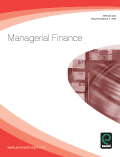
MANAGERIAL FINANCE
Scope & Guideline
Innovating Insights for Financial Leaders.
Introduction
Aims and Scopes
- Corporate Governance and Performance:
The journal frequently explores the interplay between corporate governance structures and firm performance, analyzing how different governance mechanisms influence financial outcomes and strategic decisions. - Risk Management and Financial Stability:
Research in this area focuses on understanding risk factors affecting firms, including market volatility, credit risk, and operational risks, with implications for financial stability and managerial decision-making. - Sustainability and Corporate Social Responsibility (CSR):
The journal emphasizes the importance of sustainability practices and CSR in financial decision-making, highlighting how these elements impact firm performance and investor behavior. - Financial Behavior and Market Dynamics:
Papers often investigate behavioral finance aspects, including investor sentiment, market reactions to corporate announcements, and the effects of political and economic uncertainty on financial decisions. - Emerging Market Dynamics:
A significant focus is placed on research pertaining to emerging markets, analyzing how local and global factors influence corporate finance practices in these regions. - Innovation in Financial Instruments and Practices:
The journal encourages studies on new financial products, technologies, and practices that can enhance managerial finance and investment strategies.
Trending and Emerging
- Integration of ESG Factors in Financial Decision-Making:
There is a growing trend towards integrating Environmental, Social, and Governance (ESG) factors into financial analysis and corporate strategy, reflecting a broader shift towards sustainability in finance. - Impact of Digital Transformation on Finance:
Research focusing on the effects of digital technologies, such as blockchain, AI, and big data analytics, on financial practices and corporate governance is rapidly increasing, highlighting the importance of technological advancements. - Behavioral Finance Insights:
An emerging interest in behavioral finance is evident, with studies examining how psychological factors influence investor behavior and corporate decision-making, signaling a shift towards understanding the human aspects of finance. - Political and Economic Uncertainty:
The impact of geopolitical risks and economic uncertainty on corporate financial strategies has gained increased attention, reflecting the need for firms to navigate complex global environments. - Diversity and Inclusion in Corporate Leadership:
Research exploring the effects of gender and ethnic diversity in corporate governance and its impact on financial performance is on the rise, indicating a shift towards more inclusive finance practices.
Declining or Waning
- Traditional Financial Metrics:
There has been a noticeable decrease in the focus on traditional financial metrics such as basic profitability ratios and straightforward capital structure analyses, as researchers shift towards more nuanced and complex financial evaluations. - Static Models of Financial Analysis:
The reliance on static models for financial decision-making is waning, with a growing preference for dynamic and adaptive modeling approaches that account for changing market conditions and behavioral factors. - Narrow Focus on Domestic Markets:
Research that solely examines domestic market dynamics without considering global influences is less common, as there is an increasing recognition of the interconnectedness of global financial systems. - Conventional Risk Assessment Techniques:
Traditional risk assessment methods are being overshadowed by innovative approaches that integrate behavioral insights and advanced data analytics, leading to a decline in the publication of studies relying on conventional techniques.
Similar Journals
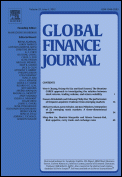
Global Finance Journal
Exploring the dynamics of economics and finance.Global Finance Journal is an esteemed periodical published by Elsevier, dedicated to the dynamic fields of finance and economics. With an impressive history spanning from 1989 to 2024, this journal holds a significant position in the academic community, boasting a Q1 quartile ranking in both Economics and Econometrics, as well as Finance, as of 2023. It is highly regarded in Scopus rankings, placing 40th out of 317 in Finance and 99th out of 716 in Economics and Econometrics, demonstrating its influence and reach among researchers and practitioners alike. Although not an open-access journal, the Global Finance Journal provides rigorous peer-reviewed articles that explore critical issues, advance theoretical frameworks, and address practical applications in global finance. As such, it serves as a vital resource for researchers, financial professionals, and students aiming to deepen their understanding of economic phenomena and contribute to the ongoing discourse in these vibrant disciplines.

International Journal of Financial Studies
Championing accessible research in the world of finance.The International Journal of Financial Studies is a premier publication dedicated to advancing the field of finance through open-access research. Published by MDPI based in Switzerland, this journal offers researchers, professionals, and students a platform to disseminate their findings in an accessible format since its establishment in 2013. With its ISSN of 2227-7072 and a commendable impact reflected in its Q2 ranking in finance, it occupies an influential position among finance-related journals, as evidenced by its 65th percentile rank in Scopus. The journal encompasses a wide array of topics in finance, making it essential reading for those seeking to stay abreast of current research trends and methodologies. As an open-access journal, all articles are freely available, significantly enhancing the visibility and reach of published studies, which is crucial for fostering collaboration and innovation within the global financial community. Published continuously until 2024, the International Journal of Financial Studies is not just a source of knowledge; it is a critical contributor to the progression of financial scholarship.
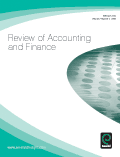
Review of Accounting and Finance
Bridging Theory and Practice in Financial ScholarshipReview of Accounting and Finance, published by EMERALD GROUP PUBLISHING LTD, is a prestigious academic journal with a longstanding commitment to advancing scholarship in the fields of accounting, finance, and economics. With an ISSN of 1475-7702 and E-ISSN of 1758-7700, this journal has established itself as a key resource for researchers, professionals, and students seeking robust empirical and theoretical insights. It enjoys a strong reputation, reflected in its 2023 Scopus rankings, where it is positioned in the top quartile for Economics and Finance, and holds a Q2 category in Accounting. The journal covers a wide range of topics, aiming to foster discussion and disseminate knowledge that bridges the gap between theory and practice. Although it does not offer open access, its comprehensive scope is invaluable for those dedicated to understanding the complexities of financial systems and accounting practices from a global perspective. Published continuously from 2002 to 2024, the Review of Accounting and Finance is an essential outlet for innovative research that drives the discipline forward.
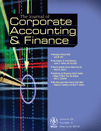
Journal of Corporate Accounting and Finance
Illuminating the Path of Corporate Accounting ExcellenceJournal of Corporate Accounting and Finance, published by WILEY PERIODICALS, INC, is a leading interdisciplinary journal that addresses the intricate dynamics of accounting and finance in corporate settings. With its ISSN 1044-8136 and E-ISSN 1097-0053, this esteemed journal has been a significant platform for the dissemination of research since 1989, now influencing discussions and policy formulation until 2024. Holding a prominent position in Q3 in Accounting and Q2 in Economics, Econometrics and Finance as of 2023, it ranks within the 66th percentile for Economics and the 39th percentile for Accounting, reinforcing its credibility in the academic community. The Journal of Corporate Accounting and Finance not only offers unparalleled insights into financial reporting, corporate governance, and ethical financial practices but also aims to foster a deeper understanding of economic theories applied within corporate frameworks. As a subscription-based journal, it remains pivotal for researchers, professionals, and students eager to stay abreast of the evolving landscape of corporate finance and accounting.
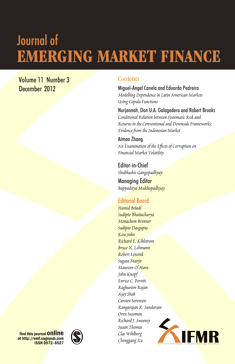
Journal of Emerging Market Finance
Catalyzing Research in Emerging Market FinanceThe Journal of Emerging Market Finance, published by SAGE Publications India Pvt Ltd, is a premier academic journal that serves as a vital resource for researchers, professionals, and students in the fields of finance and economics. Established in 2002, this journal focuses on the multifaceted dynamics of emerging market economies and their financial systems. With an ISSN of 0972-6527 and an E-ISSN of 0973-0710, it has garnered attention with its respectable Q3 rankings in both the Economics and Econometrics and Finance categories, reflecting its commitment to high-quality research. Despite its limited open-access options, the journal remains a significant platform for scholarly discussions, providing insights on emerging financial instruments, market behaviors, and economic policies in developing economies. As a continuously evolving publication, it aims to bridge the gap between theory and practice, promoting an understanding of the complexities faced in these vibrant markets, ultimately serving the academic community with relevant and impactful research until 2024 and beyond.
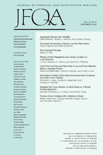
JOURNAL OF FINANCIAL AND QUANTITATIVE ANALYSIS
Pioneering Quantitative Methods for Financial ExcellenceJOURNAL OF FINANCIAL AND QUANTITATIVE ANALYSIS, published by Cambridge University Press, is a premier peer-reviewed journal that has been at the forefront of the finance and economics fields since its inception in 1966. With a notable impact factor reflecting its Q1 status in Accounting, Economics and Econometrics, and Finance for 2023, the journal is recognized for its substantial contributions to both theoretical and empirical research. Researchers and practitioners alike benefit from its comprehensive scope, addressing critical issues in financial analysis and quantitative methods. Although the journal does not currently offer open access, it remains widely accessible through institutional subscriptions. The editorial team is committed to fostering rigorous academic discussions that shape the future of finance and economics, making it an essential resource for academics, students, and industry professionals seeking to deepen their understanding of these vital disciplines. For more than five decades, this journal has continued to be an indispensable platform for disseminating influential research, thus solidifying its role as an essential cornerstone in the financial and quantitative analysis community.
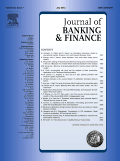
JOURNAL OF BANKING & FINANCE
Navigating the Complexities of Finance with ExpertiseWelcome to the Journal of Banking & Finance, a premier publication in the fields of finance and economics, expertly published by Elsevier. With its esteemed Q1 ranking in both the Economics and Econometrics and Finance categories for 2023, this journal frequently garners significant attention from researchers, professionals, and academics alike. Established in 1977, it has become a crucial resource for the latest research and advancements in banking and financial services, influencing policies and practices on a global scale. The journal's commitment to high-quality, peer-reviewed content ensures that it not only contributes to academic discourse but also drives real-world financial innovation. As part of the respected Elsevier publishing collection, the journal's rigorous standards and comprehensive analysis serve as indispensable tools for those seeking to understand and navigate the complexities of the financial landscape. Located in the Netherlands, the Journal of Banking & Finance continues to play a vital role in shaping the future of financial research through its impactful insights and research contributions.

Abacus-A Journal of Accounting Finance and Business Studies
Pioneering Discoveries in Accounting and FinanceAbacus: A Journal of Accounting Finance and Business Studies, published by WILEY, stands as a prominent platform dedicated to advancing the fields of accounting, finance, and business studies. With a history dating back to 1965, this journal has consistently delivered high-quality research and insights, culminating in its current status as a Q2 journal in Accounting according to the 2023 category quartiles. Operating from the United Kingdom, Abacus provides essential scholarly content for researchers, practitioners, and students alike, aiming to bridge the gap between theory and practice in its diverse sub-disciplines. Although it does not currently offer open access, its reputation is underscored by a solid Scopus ranking of #83/176 in the field of Accounting, representing the 53rd percentile for quality and impact. With its continued focus on innovative research, Abacus remains a crucial resource for anyone looking to navigate the evolving landscape of accounting and finance.
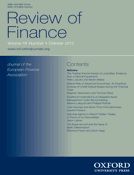
Review of Finance
Cultivating excellence in finance, accounting, and economic scholarship.The Review of Finance, published by Oxford University Press, stands as a premier academic journal in the fields of Finance, Accounting, and Economics. With an ISSN of 1572-3097 and an impressive track record stretching from 2001 to 2024, this journal is consistently recognized for its high-quality research, reflected in its Q1 rankings across key categories, including Accounting, Finance, and Economics and Econometrics. The Review of Finance is dedicated to advancing the understanding of financial phenomena through robust empirical and theoretical insights, making it an essential resource for researchers and professionals alike. Additionally, its strong Scopus rankings, placing it in the top percentiles, highlight its influence and relevance in ongoing academic discourse. Although the journal is not open access, it remains widely accessible through academic institutions, ensuring that its valuable contributions reach an extensive audience. The editorial board invites submissions that promise to further engage the academic community in the dynamic intersections of finance, accounting, and economic research.
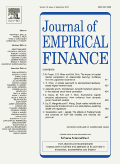
Journal of Empirical Finance
Advancing empirical insights for a dynamic financial landscape.Journal of Empirical Finance, published by Elsevier, stands as a key resource in the areas of finance and economics, with a definitive focus on empirical studies. As a prominent journal since its inception in 1993, it has made significant strides in contributing to the academic community, evidenced by its soaring categorization in Q1 for Finance and Q2 for Economics and Econometrics as of 2023. With an ISSN of 0927-5398 and an E-ISSN of 1879-1727, the journal emphasizes robust, data-driven analysis to inform both theoretical and practical aspects of financial research. While access options do not include open access, the journal ensures that its content remains accessible to a diverse audience of researchers, professionals, and students. It fosters a platform for innovative research and discourse, significantly impacting the fields of finance, economics, and econometrics. The Scopus rankings further bolster its reputation, placing it in the 61st percentile in both categories, reflecting a commitment to high-quality research output. As the journal continues to evolve, it invites contributions that push the boundaries of empirical finance, enabling a deeper understanding of financial mechanisms that drive global economies.